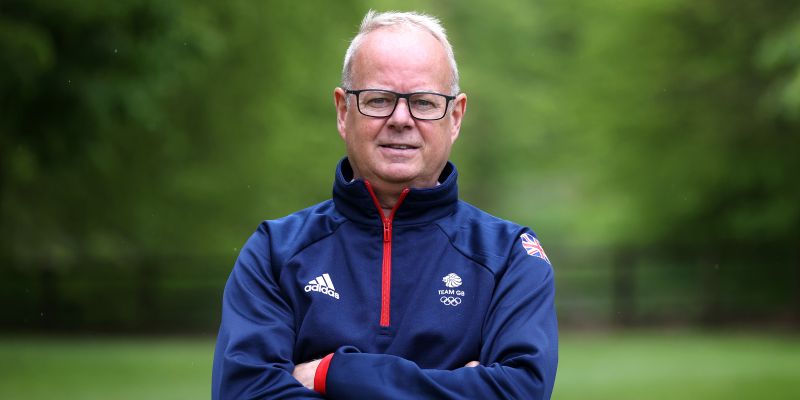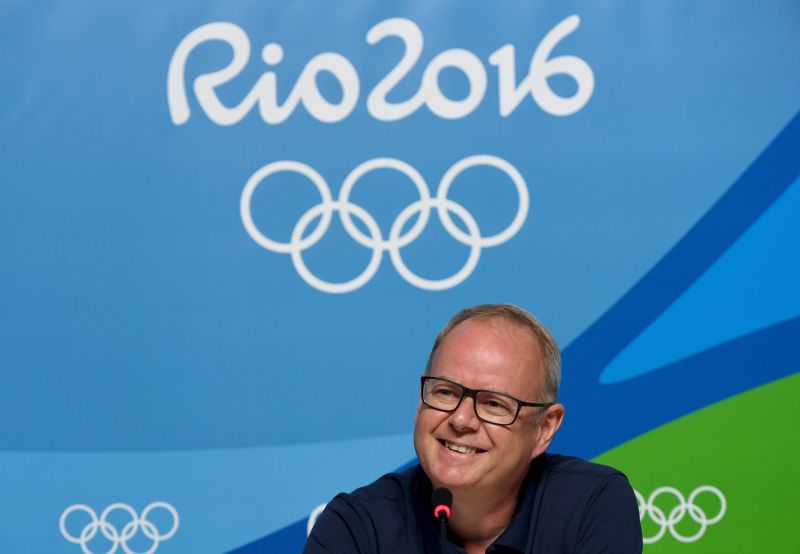
After making history as Team GB Chef de Mission at the Rio 2016 Olympics, Mark England OBE hopes to guide Team England to gold at the Commonwealth Games in Birmingham.
When Mo Farah held off his rivals to win the 5,000m gold at the Rio Olympics, he claimed Team GB’s 65th medal of the Games. It took them beyond their tally at London 2012. “We were the first National Olympic Committee in the world to win more than we did as host,” says Chef de Mission Mark England (Economic History 1981). “That race, that atmosphere, it just took our breath away.”
During Mark’s time with Team GB, there has been no shortage of breathtaking moments. Since joining the British Olympic Association in 2001, he has attended the past 11 Olympic Games (summer and winter) in a leadership role, and was Chef de Mission – leader of the national delegation – at Rio 2016 and Tokyo 2020.
He takes Team England to Birmingham with the aim of topping the medal table. No mean feat, with Team GB divided into the home nations, and Team Australia looking, “particularly strong”. But Mark has never been one to shy away from a challenge.
In his first week at Leeds, Mark joined the parachute club and leapt from a plane above Elvington Airfield, near York. “I landed in a cow field,” he laughs. “That’s what it was all about. Enjoying new experiences and making good memories.”
His passion for sport dates back to his time at Leeds too. Mark played football for the Eldon and Pack Horse pub team. He ran for the University, even racing against the likes of Seb Coe, a fact he reminds the President of World Athletics every now and then – without mentioning that the four-time Olympic medallist was “showered and home by the time I finished”.
Perhaps it was natural for a career path in the industry to follow, but at the time it wasn’t so straightforward: “There wasn’t an industry back then, but I did a postgrad in recreational management just as more attention was being paid to the importance of health, and suddenly there was investment in leisure.”
Roles followed around the country – at the GB Sports Council; as Director of Recreation and Events for Glasgow City Council; consultancy work; senior positions with Sport England – experiences Mark credits as being key to his own development: “I’d advise moving around a lot and getting a different perspective. It’s important to take the best from every experience you have.” Those experiences eventually helped Mark to become Director of Sport for the British Olympic Association, and alongside that, Chef de Mission.
“It’s a privilege,” says Mark. “That’s the only word for it. To stand at the side of a trampoline and watch double Olympic medallist Bryony Page train in front of you. To watch Amir Khan in the ring when he’s sparring. You realise the speed and the skill of these athletes.
“But then seeing them go on and win, that’s truly special.”

Mark oversees the selection process for the Games. He also does everything in his power to ensure the team perform to the best of their ability – something he has undoubtedly achieved: Team GB came second in Rio, their most successful Games since 1908. In Tokyo 2020, under exceptional COVID-19 restrictions, the team matched the medal count of London 2012 and were one of the few delegations to remain COVID free.
It’s an upturn in performance Mark puts down to two factors: “First, when you’re leading a team, you have to have a demanding mission. We brought that, and aligned everyone behind it.
“Second, it was about bringing a stronger performance and athlete focus. We took a holistic approach and put an infrastructure around the athletes to help them on that journey. That means the best support team possible, the best medical teams, physios, psychologists. Ultimately, every decision you have to ask: ‘is this going to help the athlete?”
Mark is keen to emphasise that it is not just about winning alone, but winning the right way: “It’s a team culture. We look at how athletes hold themselves with peers, in interviews, and with the team. We take a ‘one team’ approach, and we support one another.” It starts from the top. Before the Games, Mark spends time welcoming and getting to know each athlete personally – that meant 376 of them at Rio. “It’s a performance advantage, too,” Mark adds. “Make no mistake. The more that you feel you belong, that you’re coming into a safe and secure environment where you know people, the more your performance improves.”
It means Mark is on hand to watch the very best in the world prepare for the ultimate contest. So, are there any insights he’s gleaned from the best seat in the house? “One thing you learn is that it’s not always the most talented that come through. It’s often those that work the hardest in the relentless pursuit of excellence.
“The perfect example is Mark Cavendish, arguably road cycling’s greatest ever sprinter. He came to Rio having already won so much, and yet he asked so many questions. He wanted to know how the other athletes were operating – how Andy Murray was recovering, what the physios were doing, every tiny detail. His thirst for knowledge was incredible. More often than not, those searching for knowledge are the ones that take gold.”
Ahead of the Commonwealth Games, excitement is building in the England camp. Mark is spending his time visiting the teams, fine tuning plans, and asking countless questions in pursuit of his own goal – first place on the medal table.
“The Birmingham team have really done a brilliant job. We’re the hosts, so I want us to win, to do it in the right way, and truly make the country proud.”
Further information
For further details, contact Ed Newbould, Digital Communications Officer at the University of Leeds, by email on e.w.newbould@leeds.ac.uk.